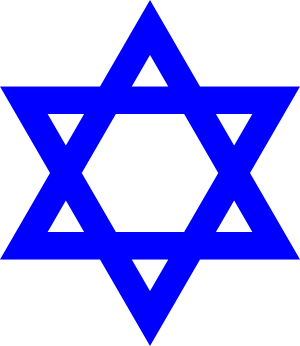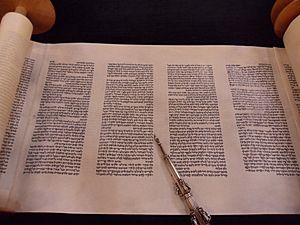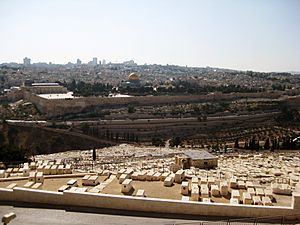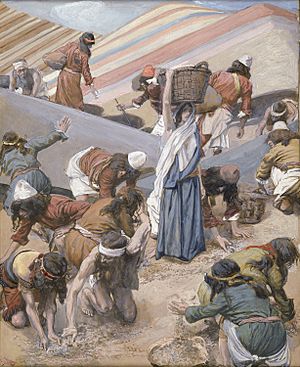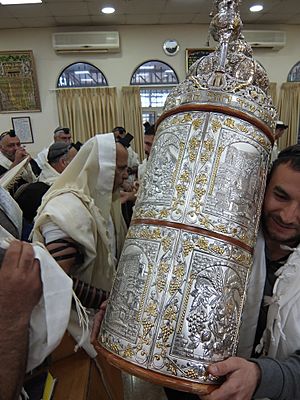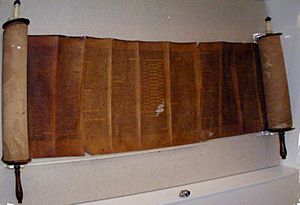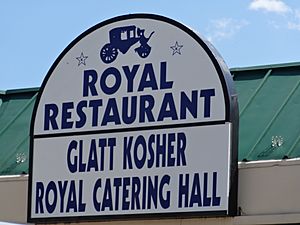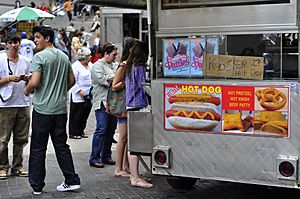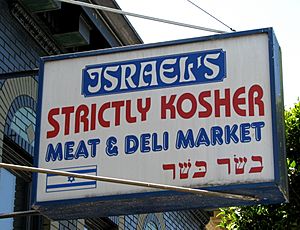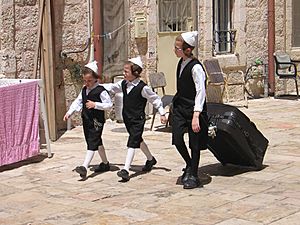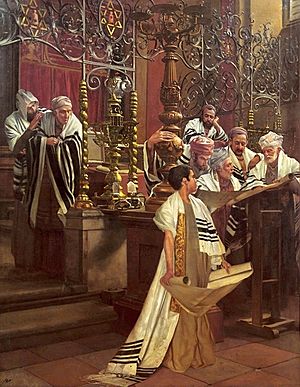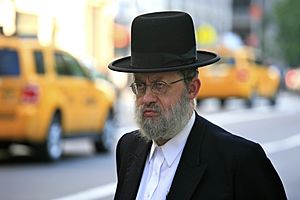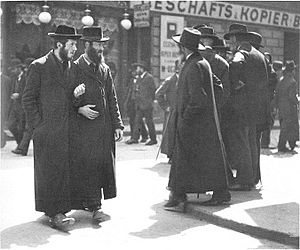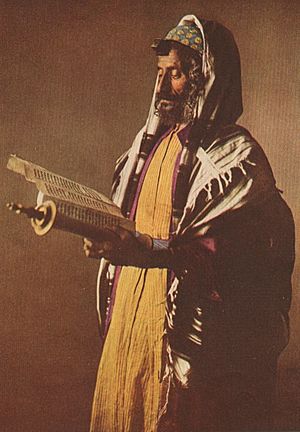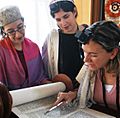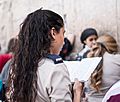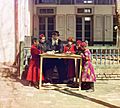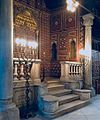Judaism facts for kids
Judaism (pronounced JOO-day-iz-um) is the oldest Abrahamic religion in the world. It started almost 4,000 years ago. About 15 million people follow Judaism, and they are called Jews. It is also the oldest religion that believes in only one God (this is called monotheism). The Torah is the most important holy book in Judaism. The rules and teachings of Judaism come from the Torah, which is the first five books of the Hebrew Bible, and from oral traditions. Some of these traditions were later written down in books like the Talmud.
Both Christianity and Islam are similar to Judaism. These religions also believe in one God and follow many of the moral teachings from the Hebrew Bible (also known as the Old Testament), which includes the Torah.
Contents
What Jews Believe
-
-
-
-
-
- Thirteen Main Beliefs
-
-
-
-
A famous Jewish teacher named Maimonides lived in the 12th century. He wrote down thirteen main beliefs in Judaism. These are called the “Principles of Faith.” They include:
- God is the one who made and rules the world.
- There is only one God, and He will always be the only God.
- God does not have a body or a physical shape. Nothing else is like Him.
- God lives forever.
- Only God can answer prayers, and people should only pray to Him.
- The words of the Prophets are true.
- Moses was the greatest of all the Prophets.
- God gave the whole Torah to Moses.
- God will not change the Torah or give another one.
- God knows what people do and think.
- God rewards good actions and punishes bad ones.
- The Messiah (a special leader) will come.
- God will bring dead people back to life when He chooses.
The three main ideas in Judaism are believing in one God (Monotheism), understanding Jewish identity, and the covenant (a special agreement between God and His people).
A very important teaching in Judaism is that there is only one God. This God wants people to be fair and kind. Judaism teaches that you serve God by learning from holy books and by doing what they teach. This includes both religious actions and being ethical. Judaism also teaches that all people are made in God's image and should be treated with dignity and respect.
One God
Judaism teaches that there is one God, and only one God. This God is Yahweh. Only God created the universe, and only He controls it. Judaism also teaches that God is spiritual, not physical.
Jews believe that God is completely one. He cannot be divided into parts. People cannot describe how He looks, only what He is and what He does.
Jews believe that all goodness and good behavior come from God. God cares about what people do and watches them.
Judaism says that God exists forever, is everywhere, and knows everything. He is beyond nature (supernatural), but He is also in the world. He hears people's prayers and can answer them. God is the most powerful force in the universe.
Judaism teaches that God lets people choose what to do. This is called “free will.” With free will, people can choose their actions, but they are also responsible for them. God rewards people who do good things and punishes those who do bad things. God gives rewards or punishments in this world, but the final reward or punishment for a person's soul happens after they die.
The Jewish People
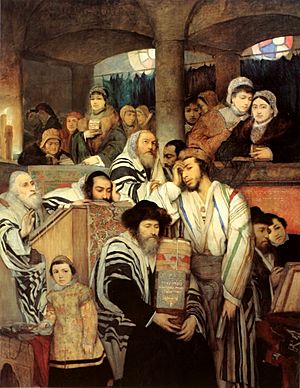
Jews believe that God made an agreement called a “covenant” with Abraham, who is an ancestor of the Jewish people. The Bible says that God promised to bless Abraham and his descendants if they worshipped God and stayed faithful to Him. God made this same covenant with Abraham's son, Isaac, and with Isaac's son, Jacob. God gave Jacob another name: Israel. This is why Jacob’s descendants are called the “Children of Israel” or “Israelites.”
Later, God gave the Torah to the Israelites through their leader, Moses. The Torah told the Israelites how to live and build their community. God gave them the Ten Commandments and other laws in the Torah.
Jews are sometimes called the “Chosen People.” This is because the Bible says God told them they would be a "holy nation" (Exodus 19:6). Jews understand this to mean they have special duties and responsibilities from God. For example, Jews must build a just society and serve only God. Jews believe this covenant works two ways: if they follow God’s laws, He will protect them. But they are also responsible for their sins (bad actions) if they don't do what God told them.
Jews believe their job is to be "a light to the nations" (Isaiah 49:6). This means showing the world ways to make it a better place. They believe God has given them a special task to "repair the world," which they call “tikkun olam.” This means making the world a better place by reducing suffering, increasing peace and respect among people, and protecting the environment.
Jews do not try to convince other people to become Jewish. They believe they have a special job to show that God exists, but people do not have to be Jewish to follow God. All people can serve God by following the Seven Commandments (rules) given to Noah. However, Judaism accepts people who choose to change their religion to Judaism.
Torah and Mitzvot
Jews believe that God tells them in the Torah how they should live. The Torah says God wants the people of Israel to follow His ways, to love Him, and to serve Him, and to keep God’s commandments (Deut. 10:12–13). In Judaism, actions are more important than beliefs, and beliefs should lead to actions.
These actions are called “mitzvot” in Hebrew (one is a mitzvah). Sometimes they are called “laws,” "rules," or “commandments.” Many people also think of a mitzvah as "a good act." There are 613 mitzvot in the Torah. Jews believe that the Torah gives mitzvot for all people; everyone must keep seven laws given to Noah. Jews must keep 613 mitzvot, which are listed in the Torah.
Some mitzvot are about how people should act towards other people. For example, they must give charity to a poor person or help someone in danger. They must not steal or lie. These are ethical and moral mitzvot.
Other mitzvot are about how people should act towards God. For example, they must respect God’s name or not work on the Sabbath. These are religious or ritual mitzvot. Jews believe that God wants them to do both ethical and religious acts.
Jews see mitzvot as actions that bring holiness to the world and bring people closer to God. They do mitzvot to make the physical world and things in it more holy, like food, drink, clothing, and daily activities. Before doing many acts, like eating, Jews say a blessing (a short prayer) to thank God for what He provides. In Judaism, life is the most holy and important thing. A Jew must stop doing other mitzvot to help save another person’s life.
Jews believe they should do mitzvot with happiness and joy because the Bible says, “Serve God with joy; come before God with singing” (Psalms 100:2). Doing a mitzvah helps a person feel close to God, which makes them happy.
The Land of Israel
The Land of Israel is holy in Judaism. Jews believe that God created the Earth from Mount Moriah in Jerusalem, which is in the Land of Israel. They believe God is always closest to this land. Jews believe this land is where God told the Jewish people to build a society to serve Him. Many mitzvot (commandments) in the Torah are about the Land of Israel.
The Jewish people believe their history as a nation began with Abraham. The Torah says God told Abraham to leave his country and promised him and his descendants a new home in the land of Canaan. This land is now called the Land of Israel. It is named after Abraham's grandson, Jacob, who was also called Israel and was the father of the twelve tribes. The land is also called “the Promised Land” because God promised to give it to Abraham's children (Gen 12:7, Gen 13:15, Gen 15:18, Gen 17:8).
Jewish teachers understood from the Torah (Num 33:53) that it is a “mitzvah” (a commandment) for Jews to live in the land of Israel. Living outside of Israel was often seen as not natural for a Jew. Jews often called lands outside Israel "galut," which means "exile" or "diaspora" (where people are scattered).
The Messiah and Making the World Better
The story of leaving Egypt, called the Exodus, is very important to how Jewish people understand the world. The Torah tells how God freed a group of slaves, the Israelites, and taught them how to be His partner in building the world. Jews see this story as a model for the whole world. They believe that in the future, the whole world will change, and everyone will serve the one God. This will be God’s kingdom on Earth. They believe all of Jewish history, and world history, is part of this process.
The prophets taught that God would send a special person to the world called the Messiah. The word Messiah comes from the Hebrew word mashiah, meaning "the anointed one." The Book of Isaiah says the Messiah will be a just king who will unite the Jewish people and lead them in God's way. The Messiah will also unite all people to serve God. People will act with justice and kindness, and the whole world will be filled with peace.
Jews still wait for the Messiah to come. Some believe this will be a specific person. Other Jews believe in a future time when justice and peace will come through everyone working together with God’s help.
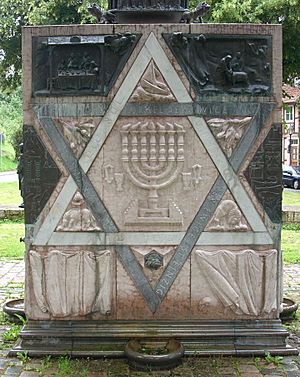
Holy Writings
Jews believe that to know what God wants them to do, they must study the books of Torah and its laws and do what they teach. These books include laws about how to treat other people and how to serve God.
The two most important groups of books in Judaism are the Bible and the Talmud. Jewish beliefs and actions come from these books. Jewish teachers and scholars also wrote more books called commentaries. These explain and add more details to what is written in the Bible and Talmud.
The Torah
The Torah is the most important of all Jewish writings. It is made up of the first five books of the Hebrew Bible (which Christians call the "Old Testament"). The Torah contains the basic laws of Judaism and tells the history of the Jews until Moses died. Jewish tradition says that God told Moses what to write in the Torah, which is also called the Five Books of Moses. Religious Jews believe that Moses brought the Ten Commandments and the rest of the Torah down from Mount Sinai. The Ten Commandments are special because all the Jewish people heard them at Mount Sinai. However, in traditional Judaism, all 613 mitzvot in the Torah are equally important.
Jews divide the Hebrew Bible into three parts and call it the Tanakh. The three parts are the Torah (the first five books), the Nevi'im (the books of the prophets), and the Ketuvim (meaning the Writings, which are other books of history and moral teachings).
The Talmud
Rabbinic Jews also believe there is another part of the Torah besides the five books of Moses. It is called the Mishnah, also known as the Oral Torah or Oral Law. It explains how to follow the laws written in the five books. There is also an explanation of the Mishnah, called the Gemara. Together, the Mishnah and the Gemara make up the Talmud. However, Karaite Jews believe there is no additional Torah beyond the five books of Moses.
Traditional Jews believe that God gave both the written Torah and the oral Torah to Moses, and that Moses passed it down to the Jewish people. They believe it is the same today as it was back then. Traditional Jews also believe that all the commandments must still be followed today.
Liberal Jews believe that the Torah was inspired by God but written by people. Liberal Jews believe that all the ethical laws in the Torah must still be followed, but many ritual laws do not need to be followed today.
In Judaism, it is considered good to discuss the commandments and try to understand how to follow them. The Talmud has many stories about Rabbis who argued about the commandments. Over time, some opinions became the rule for everyone. Some rules are still debated. Jews value logical discussion and searching for truth.
There is no single leader in Judaism who decides how to follow the commandments or what to believe. Even though Jews have different beliefs and disagree about some rules, they are still one religion and one people.
Daily Life
Kashrut: Jewish Food Laws
Jews who follow religious rules called "kashrut" only eat certain types of food prepared by special rules. Food that a Jew can eat is called kosher food.
Traditional Jews are very careful about kashrut. They usually cannot eat many foods in non-kosher restaurants or in the home of someone who does not keep kosher. This is an important part of their religion. People can help by choosing to eat with Traditional Jews in a kosher restaurant or by serving them kosher food at home.
Liberal Jews are not as careful about kosher, though some may follow some rules.
Kosher Foods
- Jews can eat any fresh fruit or vegetables that do not have insects on or in them.
- Jews can eat any fish that has scales and fins, like salmon and tuna. They cannot eat seafood like shrimp, lobster, or mussels.
- Jews can eat meat from animals that chew their cud (food that has been partly digested) and have split hooves. Examples include cows, sheep, deer, and goats. However, the animal must be killed and prepared in a specific way to be kosher.
- Jews can eat many common birds like chickens, turkeys, and ducks. These birds must also be killed and prepared in a specific way. Jews cannot eat birds of prey, like vultures.
- Foods sold in stores or restaurants must be checked by a Jew who is an expert in Kashrut. This person is called a "mashgiach," or kosher overseer. They make sure the kosher rules were followed. Foods bought at the store often have a symbol called a hechsher to show they have been checked.
- Honey is made by bees, but it is kosher.
- It is a common myth that kosher food must be blessed by a rabbi. A rabbi cannot bless food to make it kosher.
Non-Kosher Foods
- Some call non-kosher foods "Treifah," meaning "torn." This comes from the Torah's rule not to eat an animal killed or torn by another animal.
- Jews cannot eat animals that do not have split hooves or do not chew their cud. For example, pigs have split hooves but do not chew their cud, so they are not kosher.
- Jews cannot eat rodents, reptiles, or amphibians.
- Jews cannot eat any sea animal that does not have scales and fins. For example, sharks, eels, crabs, shrimp, and lobsters are not kosher.
- Jews cannot eat birds that eat meat, like vultures, which are listed in the Torah.
- Jews cannot eat most insects, except for a few types of crickets or locusts.
Other Kosher Rules
There are other rules for kosher food:
- Animals must be killed in a certain way, including a fast strike across the neck with a very sharp blade to ensure the animal dies quickly.
- All the blood must be removed from an animal before the meat is eaten. This is done by soaking and salting the meat.
- A Jew cannot eat a meal that has both meat and milk in it. This comes from a rule in the Torah that a Jew must not cook a young goat in its mother's milk. Because of this, Jews use separate dishes and utensils for meat foods and milk foods.
- After eating meat, many Jews wait between 1 to 6 hours before drinking milk products.
- Kosher food must be cooked in a kitchen meant for kosher food. If a kitchen has been used to cook non-kosher food (like rabbit or pig), it must be cleaned in a special way before it can be used to cook kosher food.
Holidays
Shabbat
One of the commandments is to keep the Jewish Sabbath, or Shabbat. Shabbat starts every Friday at sunset and ends on Saturday at nightfall. Shabbat is a day of rest to thank God for making the universe.
The tradition of resting on Shabbat comes from the Torah. According to the Torah, God created the world in six days and rested on the seventh day, Shabbat. Many Jews go to their temple or synagogue to pray on Shabbat.
Religious Jews follow special rules on Shabbat. These rules mean Jews should not do creative work on Shabbat. One reason for this is to give people a break from their busy week. This helps them focus more on appreciating God, their family, and the world around them. It also reminds people that God is the creator and ruler of the world. Many of these "creative work" actions might not seem like work. For example, on Shabbat a Jew cannot:
- Use electrical machines like phones, computers, or a TV.
- Buy or sell things.
- Turn on or off a fire or a light.
- Drive a car or ride a bicycle.
- Cook.
- Write.
- Build or fix things.
Traditional Jews are very careful about Shabbat. It is a special day. They clean their houses and prepare special food for Shabbat. They dress in their nicest clothes. They sing beautiful songs and say extra prayers in the synagogue. They have dinner and lunch with their families, often inviting guests. They eat special delicious food and sing traditional Shabbat songs together. On Shabbat afternoon, people study Judaism or visit friends.
Liberal Jews do not follow all these rules. Some go to synagogue, visit friends, or have special meals. But they may also talk on the phone, drive cars, and go shopping.
Important Moments in a Jewish Life
- Birth
- Brit Milah (for boys): A circumcision ceremony when a boy is 8 days old. It includes naming the baby. Some non-Orthodox Jews have a Brit Shalom (naming ceremony for boys without circumcision).
- Pidyon haben (for boys): A special ceremony where a father "redeems" his first son from serving in the Temple. This ritual is not done by Levites or Cohanim (specific tribes of Israel).
- Bat Mitzvah (for girls): A 'coming of age' ceremony when a girl turns 12 (or 13 for some Jews). "Bat Mitzvah" means "daughter of the commandment" in Hebrew. After this age, a girl is considered a woman and is expected to follow Jewish law. A ceremony is not required, and the term also refers to the girl herself.
- Bar Mitzvah (for boys): A 'coming of age' ceremony when a boy turns 13. It often includes reading from the Torah and special prayers. "Bar Mitzvah" means "son of the commandment" in Hebrew. After this age, a boy is considered a man and is expected to follow Jewish law. A ceremony is not required, and the term also refers to the boy himself.
- Marriage
- Having Children
- Death
Kinds of Judaism
For a long time, most Jews in Europe shared similar basic beliefs. About 200 years ago, some Jews in Germany decided to become more "modern" and more like Germans. These Jews were called Reform Jews.
Today, there are three main kinds of Judaism: Reform, Conservative, and Orthodox Judaism. There are also smaller groups like Reconstructionist Judaism and Karaite Judaism. Each group has its own ways of practicing based on how they understand Jewish laws.
- Reform Judaism (also called Liberal or Progressive) encourages people to choose the Jewish practices that mean the most to them. They focus on the ethical laws of Judaism.
- Conservative Judaism developed after Reform Judaism. Its leaders felt Reform Judaism changed too much. They wanted to protect Jewish tradition.
- Orthodox Jews believe that the laws given by God are timeless and cannot be changed. They do not believe Reform or Conservative Judaism are correct in changing these laws.
In the United States, surveys show that many American Jews identify as Reform (35%), Conservative (27%), or Orthodox (10%).
In Israel, most Jews go to Orthodox synagogues. Jews in Israel often use different terms for themselves: "Haredi" (completely religious), "Dati" (basically religious), "Masorati" (traditional/conservative), or "Chiloni" (secular).
Names of God
Names are very important in Judaism. Many Jews believe that a name tells you something about a person. Names of God are very special, so Jews often do not write or say them fully. That is why some Jews write G-d, with a "-" instead of an "o."
- HaShem (pronounced Hah-SHEM): Means "The Name." This is the word Jews use most often when not praying to talk about God.
- Adonai (pronounced Ah-doh-NAI): Means "My Lord." This name shows God's position as the King of the World.
- Elohim (pronounced Eh-loh-HEEM): Means "one who is strong enough to do everything." This name is used when talking about God's power to create or His justice. It shows that God is the creator and rules the world with fair laws.
The names Adonai and Elohim are so special that Orthodox Jews use them only when they pray or read the Torah. When they are not praying or reading the Torah, they say "HaShem" or "Elokim."
- G-d: Some Jews write "God" by replacing the "o" with a dash, like "G-d." They do this because God's name is very holy, so they are not allowed to throw away a piece of paper with "God" written on it. However, some say "God" is just an English word, not Hebrew, and so it is not as holy.
- YHWH (often pronounced "Yehovah" or "Yahweh"): This is the most sacred name of God in Hebrew. Most Jews do not say it aloud. No one knows exactly where the name came from or what it means. It looks like the Hebrew word "hayah," which means "to be." (The Bible says when Moses asked God who He was, God said, "I am that I am." ) Jews believe that the name YHWH shows that God is endless. Instead of trying to say it, most Jews say "haShem" (The Name). Scholars sometimes call "YHWH" the Tetragrammaton, from Greek words meaning "four letters."
Images for kids
-
A painting of Moses decorates the Dura-Europos synagogue dating from 244 CE
-
The Western Wall in Jerusalem is a remnant of the wall encircling the Second Temple. The Temple Mount is the holiest site in Judaism.
-
Aleppo Codex, a Tanakh produced in Tiberias in the 10th century
-
A man holds up a Sephardi-style torah at the Western Wall, Jerusalem
-
Statue of Maimonides in Córdoba, Spain
-
Jewish boys wearing tzitzit and kippot play soccer in Jerusalem
-
Men wearing tallitot pray at the Western Wall
-
Two braided Shabbat challahs placed under an embroidered challah cover at the start of the Shabbat meal
-
The Sarajevo Synagogue in Sarajevo, Bosnia and Herzegovina
-
Two boys wearing tallit at a bar mitzvah. The torah is visible in the foreground.
-
The Bereavement (Yahrtzeit) Hasidic tish, Bnei Brak, Israel
-
Jewish students with their teacher in Samarkand, Uzbekistan c. 1910.
-
The 12th century Synagogue of Santa María la Blanca in Toledo, Spain was converted to a church shortly after anti-Jewish pogroms in 1391
-
Muslim women in the mellah of Essaouira
See Also
 In Spanish: Judaísmo para niños
In Spanish: Judaísmo para niños
 | Percy Lavon Julian |
 | Katherine Johnson |
 | George Washington Carver |
 | Annie Easley |


